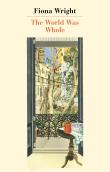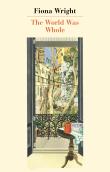AustLit
Latest Issues
AbstractHistoryArchive Description
"Our bodies and homes are our shelters, each one intimately a part of the other. But what about those who feel anxious, uncomfortable, unsettled within these havens? In The World Was Whole, Fiona Wright examines how we inhabit and remember the familiar spaces of our homes and suburbs, as we move through them and away from them into the wider world, devoting ourselves to the routines and rituals that make up our lives. These affectingly personal essays consider how all-consuming the engagement with the ordinary can be, and how even small encounters and interactions can illuminate our lives.
"Many of the essays are set in the inner and south-western suburbs of a major Australian city in the midst of rapid change. Others travel to the volcanic coastline of Iceland, the mega-city of Shanghai, the rugged Surf Coast of southern Victoria. The essays are poetic and observant, and often funny, animated by curiosity and candour. Beneath them all lies the experience of chronic illness and its treatment, and the consideration of how this can reshape and reorder our assumptions about the world and our place within it." (Publisher's website)
Publication Details of Only Known VersionEarliest 2 Known Versions of
Works about this Work
-
Reneé Pettitt-Schipp Reviews The World Was Whole by Fiona Wright
2020
single work
review
— Appears in: Plumwood Mountain [Online] , September 2020;
— Review of The World Was Whole 2018 selected work essay -
What I’m Reading
2019
single work
column
— Appears in: Meanjin Online 2019; -
Comfortable and Comforted : The World Was Whole by Fiona Wright
2019
single work
essay
— Appears in: Sydney Review of Books , May 2019;'In the opening essay of The World Was Whole, Fiona Wright connects our bodies and our living spaces, and the way we strive to feel at home – ‘comfortable and comforted’ – in each. This is a book about the complexities of home, about being unhomed, about the body as home, and about the spaces we work to make home, our dwellings and our neighbourhoods. When life is marred by unbelonging and grief, it is the habits and routines of being homed that bring comfort and even joy.' (Introduction)
-
Gabriella Munoz Reviews The World Was Whole by Fiona Wright
2019
single work
— Appears in: Mascara Literary Review , March no. 23 2019;
— Review of The World Was Whole 2018 selected work essay'With four published books, poet, essayist and critic Fiona Wright has become an important voice in the Australian literary scene. Born in 1983 in New South Wales, Wright published her first collection of poems, Knuckled, in 2011. In it, she explores issues such as belonging, identity and sense of place, three themes that constantly re-emerge in her writing. Knuckled was followed by the book of essays Small Acts of Disappearance: Essays on Hunger (Giramondo, 2015), where she writes candidly about her anorexia. This condition, which developed as a consequence of a rare stomach problem, has marked her adult years by triggering questions of what it means to live in a changing and often foreign body. For this book she won the 2016 Nita B. Kibble Award and the Queensland Literary Award for non-fiction. The book was followed by the collection of poems Domestic Interior (Giramondo, 2017), in which, as Magdalena Ball explained, Wright is skilful in conflating ‘the domestic or familiar with the moment of transformation’.' (Introduction)
-
Fiona Wright : The World Was Whole
2018
single work
review
— Appears in: The Saturday Paper , 6-12 October 2018;
— Review of The World Was Whole 2018 selected work essay'Fiona Wright’s second collection of essays, the follow-up to 2015’s superb Small Acts of Disappearance, is concerned with dark matter. Not the invisible stuff that makes up most of our universe, but those hidden parts of human life made from particles of habit.' (Introduction)
-
Fiona Wright : The World Was Whole
2018
single work
review
— Appears in: The Saturday Paper , 6-12 October 2018;
— Review of The World Was Whole 2018 selected work essay'Fiona Wright’s second collection of essays, the follow-up to 2015’s superb Small Acts of Disappearance, is concerned with dark matter. Not the invisible stuff that makes up most of our universe, but those hidden parts of human life made from particles of habit.' (Introduction)
-
Gabriella Munoz Reviews The World Was Whole by Fiona Wright
2019
single work
— Appears in: Mascara Literary Review , March no. 23 2019;
— Review of The World Was Whole 2018 selected work essay'With four published books, poet, essayist and critic Fiona Wright has become an important voice in the Australian literary scene. Born in 1983 in New South Wales, Wright published her first collection of poems, Knuckled, in 2011. In it, she explores issues such as belonging, identity and sense of place, three themes that constantly re-emerge in her writing. Knuckled was followed by the book of essays Small Acts of Disappearance: Essays on Hunger (Giramondo, 2015), where she writes candidly about her anorexia. This condition, which developed as a consequence of a rare stomach problem, has marked her adult years by triggering questions of what it means to live in a changing and often foreign body. For this book she won the 2016 Nita B. Kibble Award and the Queensland Literary Award for non-fiction. The book was followed by the collection of poems Domestic Interior (Giramondo, 2017), in which, as Magdalena Ball explained, Wright is skilful in conflating ‘the domestic or familiar with the moment of transformation’.' (Introduction)
-
Reneé Pettitt-Schipp Reviews The World Was Whole by Fiona Wright
2020
single work
review
— Appears in: Plumwood Mountain [Online] , September 2020;
— Review of The World Was Whole 2018 selected work essay -
Finding Home
Jo Case
(interviewer),
2018
single work
interview
— Appears in: Books + Publishing , August vol. 98 no. 1 2018; (p. 31)"With her second essay collection The World Was Whole, Fiona Wright 'continues to set the standard for the essay form in Australia', writes reviewer Jo Case. She speaks to the author." (Introduction)
-
Shelter
2018
single work
review
— Appears in: Australian Book Review , October no. 405 2018; (p. 14-15)'For a homeless person, home is the street and the moveable blanket or bedroll. Ultimately, the only home remaining is the body. Fiona Wright is not homeless, she has been un-homed by her body’s betrayal. Whether she can ever feel that she fits again is the primary theme of her second collection of essays, The World Was Whole.' (Introduction)
-
Comfortable and Comforted : The World Was Whole by Fiona Wright
2019
single work
essay
— Appears in: Sydney Review of Books , May 2019;'In the opening essay of The World Was Whole, Fiona Wright connects our bodies and our living spaces, and the way we strive to feel at home – ‘comfortable and comforted’ – in each. This is a book about the complexities of home, about being unhomed, about the body as home, and about the spaces we work to make home, our dwellings and our neighbourhoods. When life is marred by unbelonging and grief, it is the habits and routines of being homed that bring comfort and even joy.' (Introduction)
-
What I’m Reading
2019
single work
column
— Appears in: Meanjin Online 2019;
Awards
- 2020 shortlisted New South Wales Premier's Literary Awards — Douglas Stewart Prize for Non-Fiction
- 2019 longlisted 'The Nib': CAL Waverley Library Award for Literature
- 2019 shortlisted Mascara Avant-garde Awards — Non-Fiction
- 2019 longlisted The Stella Prize





